". . . born of the Virgin Mary, suffered under Pontius Pilate, was crucified, died, and was buried."
On Sunday, 26 September 2004, Mr. Hunter continued his series of sermons on
The Apostles' Creed by focusing upon the
humanity of Jesus Christ. As Pastor Hunter explained, some early thought in the Christian church denied Christ's divinity, in particular the
Gnostics, who believed Christ was fully human, and
Docetism, which claimed Christ was fully spirit that only seemed to appear in human form. It was in reaction to this kind of thought that the Apostles' Creed insists Jesus Christ is fully divine
and fully human. The Creed emphasizes human experience with the verbs
born,
suffered, and
died.
Mr. Hunter focused upon three reasons why Christ's human nature is important to our theology.

First, the
Incarnation——thanks to Christ's Incarnation,
God knows what it is to be human. Christ experienced the full range of human experience, and so God understands His human creation completely. In comparison, Mr. Hunter referred to
Data (pictured at right), the beloved android character from the TV show
Star Trek: The Next Generation. Although superior to humans and computers in innumerable ways, Data was keenly aware of his lack of humanity. He never, for instance, could have a spontaneous, unstudied reaction to situational humor. Because he was not human, Data never fully understood human begins. Thanks to the Incarnation, God understands the nature of humanity completely.
Secondly, Christ's willingness to assume human flesh
reveals the depths of God's love for commitment to us, His creation. Christ became our link to God, the one whose human life helps lead us to God. To illustrate this concept, Mr. Hunter retold the
Parable of the Birds, in which a farmer wishes he could become a bird in order to lead some pitiful, freezing birds to safety. So God became human to lead us to Him.
Finally, a fully human Christ functions as the
best possible example for us fellow humans in our troubles. When Christ experienced hunger, thirst, exhaustion, and depression during His 40 days in the wilderness, his temptation represents genuine human suffering which he overcame using his human resources. Christ's example shows us that we, too, can overcome temptation, with God's help.





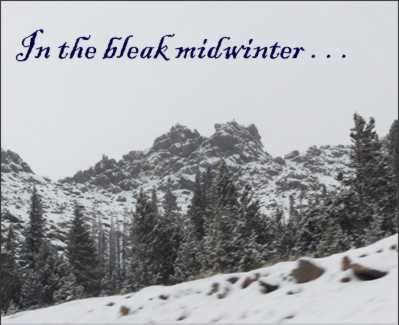
 The Senior High Youth Fellowship is selling
The Senior High Youth Fellowship is selling 
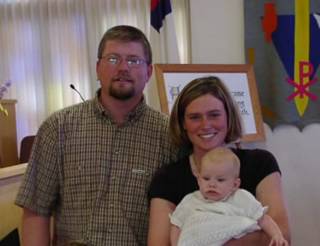
 Consequently, says Mr. Hunter, the beginning of The Apostles' Creed with
Consequently, says Mr. Hunter, the beginning of The Apostles' Creed with 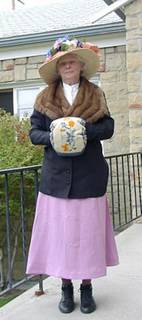 On Sunday, 12 September 2004, Union Presbyterian Church celebrated its 95th anniversary. While the actual founding of the church dates 14 February 1909, the church delayed the celebration to augment Rally Day and the start of a new year of Christian Education and worship activities.
On Sunday, 12 September 2004, Union Presbyterian Church celebrated its 95th anniversary. While the actual founding of the church dates 14 February 1909, the church delayed the celebration to augment Rally Day and the start of a new year of Christian Education and worship activities.
 chicken dinner, with members of the congregation carrying in salads and desserts.
chicken dinner, with members of the congregation carrying in salads and desserts.

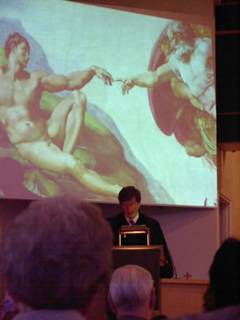
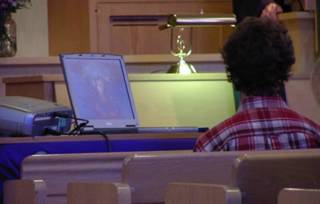
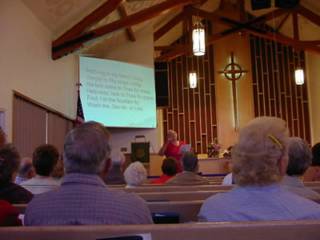
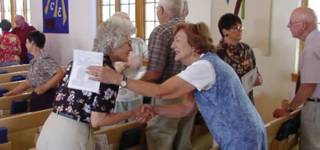
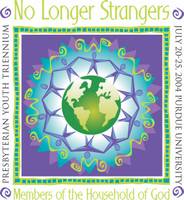


 Ending the presentation, Caiti Barski described how she loved the sermon she heard by Mark Lomax of Georgia (left), whose fired-up testimony seemed like "more of a Baptist than a Presbyterian." She described the dramatic climax to another of the group's worship services, a piece of theatre where a wall was broken down to reveal the crucified body of Christ. We must, she said, get past the walls we've set up between us.
Ending the presentation, Caiti Barski described how she loved the sermon she heard by Mark Lomax of Georgia (left), whose fired-up testimony seemed like "more of a Baptist than a Presbyterian." She described the dramatic climax to another of the group's worship services, a piece of theatre where a wall was broken down to reveal the crucified body of Christ. We must, she said, get past the walls we've set up between us.

